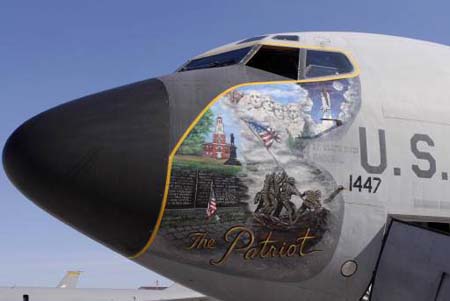Boeing a nd Northrop Grumman yesterday submitted the final proposals for their respective KC-767 and KC-30 tanker aircraft to the Air Force in the multi-billion-dollar KC-X tanker-recapitalization contest. “We believe the KC-767 Advanced Tanker will be evaluated as the most capable, technologically advanced and affordable tanker for America,” Jim Albaugh, president and CEO of Boeing Integrated Defense Systems, said in a company release. Boeing said the KC-767 is tailored “to meet or exceed all of the Air Force’s mission requirements” and noted that, as a medium-sized aircraft, it would provide the operational flexibility that a larger platform cannot. The company took a few direct swipes at its competitor, saying the comparatively larger KC-30 would be “oversized” and “provide unnecessary capacity.” Conversely, Ronald Sugar, Northrop Grumman chairman and chief executive officer, said the KC-30 “not only offers greater capabilities and versatility than any tanker available today, it offers the lowest entry risk” and “meets all of the Air Force’s key requirements.” The KC-30, a militarized derivative of the Airbus A330 commercial airliner, “is clearly a ‘game changer,’ ” he continued, “in that it is the only solution to provide the potential breakthrough in future Air Force air mobility capability as the C-17 did in replacing the venerable C-141.” The Air Force intends to acquire up to 179 KC-X aircraft to replace the oldest of its Eisenhower-era KC-135 tankers. February was the expected contract award month, but senior service officials have said the date may slip since they intend to complete the extensive source-selection process properly and not rush a decision.
nd Northrop Grumman yesterday submitted the final proposals for their respective KC-767 and KC-30 tanker aircraft to the Air Force in the multi-billion-dollar KC-X tanker-recapitalization contest. “We believe the KC-767 Advanced Tanker will be evaluated as the most capable, technologically advanced and affordable tanker for America,” Jim Albaugh, president and CEO of Boeing Integrated Defense Systems, said in a company release. Boeing said the KC-767 is tailored “to meet or exceed all of the Air Force’s mission requirements” and noted that, as a medium-sized aircraft, it would provide the operational flexibility that a larger platform cannot. The company took a few direct swipes at its competitor, saying the comparatively larger KC-30 would be “oversized” and “provide unnecessary capacity.” Conversely, Ronald Sugar, Northrop Grumman chairman and chief executive officer, said the KC-30 “not only offers greater capabilities and versatility than any tanker available today, it offers the lowest entry risk” and “meets all of the Air Force’s key requirements.” The KC-30, a militarized derivative of the Airbus A330 commercial airliner, “is clearly a ‘game changer,’ ” he continued, “in that it is the only solution to provide the potential breakthrough in future Air Force air mobility capability as the C-17 did in replacing the venerable C-141.” The Air Force intends to acquire up to 179 KC-X aircraft to replace the oldest of its Eisenhower-era KC-135 tankers. February was the expected contract award month, but senior service officials have said the date may slip since they intend to complete the extensive source-selection process properly and not rush a decision.
Lt. Gen. Dan Caine, nominee to be chairman of the Joint Chiefs of Staff, told the Senate Armed Services Committee that the Defense Department needs to upgrade its electronic warfare capability and its EW training ranges; just as his predecessor said at his own confirmation hearing.